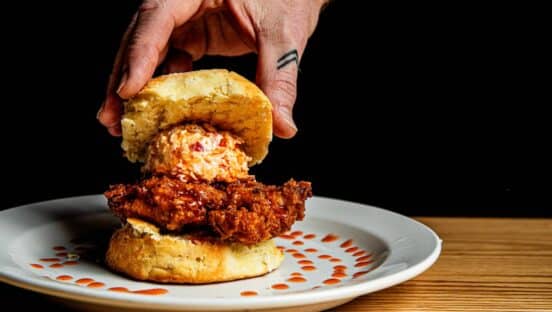While dine-in options might permanently suffer from the coronavirus pandemic, the ghost-kitchen trend has sprung to life. This is hardly news for food platform C3, which had already championed off-premises concepts before the pandemic. Virtual brand Plant Nation is only the latest addition to the company’s ghost-kitchen artillery, this time targeting regular consumers of the plant-based segment.
C3 conceptualized the idea for Plant Nation last year, but chief culinary officer Martin Heierling says it wasn’t supposed to launch until later in 2020. When the pandemic highlighted such strong demand for healthy delivery options, the brand went online two months earlier than scheduled.
“As soon as [the country] shut down, we really went to work instead of not knowing what to do,” Heierling says. “People right now want healthy options. We must make this available to them.”
The brand started operating out of ghost kitchens on the West Coast, where a high demand for plant-based products already existed. And while early sales confirmed the popularity of vegan and strictly plant-based choices, Heierling didn’t want to label Plant Nation under umbrella terms like “vegan” or “vegetarian,” which carry a stigma for some.
“When you call a vegan out, you just lost the interest of a lot of people that would’ve actually entertained [getting the food],” Heierling says. “When I eat this, it doesn’t matter whether it is vegan or not.”
He is instead interested in forming Plant Nation around tenets of wellness and sustainability, down to its eco-friendly packaging.
The brand’s holistic identity starts from its plant-based menu. It sells tried-and-true bowls and salads to satisfy the quintessential green eater, but it’s less-orthodox options are also grabbing attention. Customers can order plant-based sandwiches and pizza, with pasta offerings on the horizon.
Pizza is perhaps the biggest stronghold for Plant Nation; Heierling calls it the “anchor.” One of its top sellers is the Toscana, a plant-based pizza topped with mozzarella, shiitake mushrooms, and heavy helpings of Impossible Meat. Heierling considers the Toscana’s positive reception a feat, as it demonstrates that consumers can enjoy meat pizzas without the meat.
“From the menu perspective, the pizza segment was a big one, because it’s the easiest introduction to show the brand and then go like, ‘Hey, we’ve got more,’” Heierling says.
But where Plant Nation diverges from other like-minded companies is its flexibility. The brand offers additions like cheese, fish, and chicken if customers choose. These “flexitarian” options cast a wider net, appealing to family-sized groups with the opportunity to eat plant-based in a flexible manner.
Plant Nation prepares its food out of 18 ghost kitchens, mostly concentrated around Los Angeles and San Francisco; C3 has 67 ghost kitchens in total. But Heierling is aware of the different expansion considerations ghost kitchens have compared to your typical brick-and-mortar.
Plant Nation
FOUNDER: Sam Nazarian
HEADQUARTERS: Los Angeles
YEAR STARTED: 2020
TOTAL UNITS: 18
FRANCHISED UNITS: 0
“With this model, you can’t just do one-offs because it doesn’t lend itself for oversight and quality assurance,” Heierling says. “You need to saturate the current markets first. If we go to New York, we’re not just going to open one. We’re going to open 10. That gives us the infrastructure to support the business model itself.”
The brand also has spatial considerations to keep in mind, as its ghost kitchens share prep areas with other C3 virtual brands like Sam’s Crispy Chicken and sushi concept Krispy Rice.
Heierling says C3’s sweet spot is to have five brands operating out of one kitchen, but the number can change depending on the circumstance.
As a virtual brand under C3’s umbrella, Plant Nation not only enjoys lower startup costs, but also a wider marketing reach. C3’s parent company, hospitality group SBE, handles promotion through its networks in the hotel and nightlife industries. C3’s access to these parts of the hospitality industry are a unique opportunity to be the first mover in untapped markets. For example, Plant Nation could operate out of a hotel’s kitchen.
“The hotel gets the picture that they have options available to them that they never had in the traditional hotel environment,” Heierling says. “Forget about just online ordering. It becomes the room-service solution.”
Plant Nation is set to give consumers a sit-down experience once C3’s food complex, Citizens, opens in New York. The 40,000-square-foot complex seeks to bring many of the company’s virtual brands into one food hall, and is set to open by the end of this year.
Other than service expansion, Plant Nation is focusing on technological developments to take itself to the next level. The brand relies on third-party delivery apps to offer its product, which Heierling says can be limiting. By the end of Q4, Heierling hopes C3’s mobile app will be completed so that consumers can order from a variety of the company’s brands in a streamlined fashion.
“The pandemic has done one thing: change people,” he says. “The quick-service solution driven out of ghost kitchens and delivery platforms is here to stay, and I think it’s solidified itself.”




